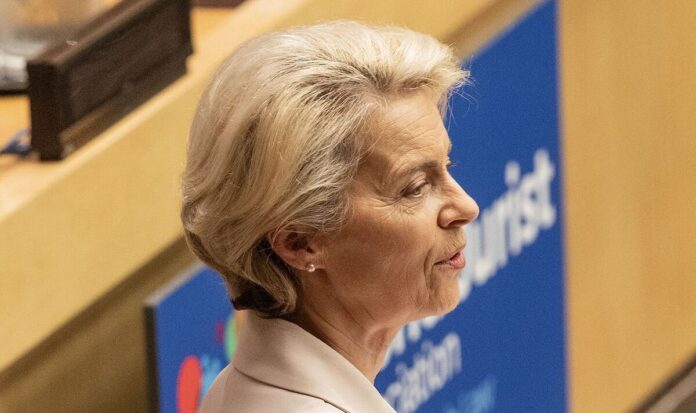The eurozone is ‘weakening’ in the face of spiking inflation, a UK-based tax consultant has said. Bob Lyddon spoke after economists at Frankfurt-based Commerzbank issued similar warnings, suggesting developments in the United States were putting the euro under ‘pressure’. The euro was valued at €1.10 just before noon today and at 0.86 against the pound. Mr Lyddon, who issued a major warning about eurozone debt last week , told Express.co.uk: ‘The European Central Bank (ECB) finds itself fresh out of policy measures to respond to the weakening of the eurozone economy. ‘Interest rates have risen, and money supply has fallen, as the ECB has curtailed and even reversed some of its huge bond-buying and lending programmes.’ ECB chief Christine Lagarde and Ursula von der Leyen, European Commission President (Image: GETTY) He continued: ‘The ECB cannot suddenly change tack and attempt to reflate the Eurozone economy. ‘Like the Bank of England, its initial failure to respond to inflation has left it trailing the Federal Reserve, and it must match the Fed’s increases in interest rates, or risk the currency collapsing, dissuading investors from buying up the new issues of debt that are required to fund public expenditure both at the member state level, and through European institutions like the EU itself and its €750billion Coronavirus Recovery Fund.’ To that extent both the ECB and the Bank of England have become forms of ‘tracker fund’ mimicking the Fed, he explained. A tracker fund is an investment fund that mirrors the price performance of an asset or group of different assets – in this instance, the Federal Reserve. French President Emmanuel Macron in Papua New Guinea (Image: Getty) Mr Lyddon added: ‘The eurozone’s predicament is all the worse because of their dependence on exports to China – whose economy seems to be falling precipitously – and their proximity to Ukraine and the associated issues of energy supplies and the threat of war spilling over onto their territory.’ A statement issued by Commerzbank yesterday stated: ‘The ECB is likely to remain concerned regarding inflation in the Eurozone, while also being hopeful that the positive development will continue. Contrary to the situation in the US, the economy in the eurozone is weakening, which is likely to put pressure on EUR. ‘If inflation then continues to move in the right direction, rate cut speculation for the eurozone might be re-fuelled. Britain, led by Prime Minister Rishi Sunak, has never been a member of the eurozone (Image: Getty) ‘Once again market participants have to be patient though as there will be no significant new data from the Eurozone this week. ‘Next week’s GDP data might provide more momentum again.’ Britain, which quit the European Union in 2020, opted not to adopt the euro as its currency, instead retaining the pound. The 20 countries which do use it – and their 346 million people – saw 0.3 recent growth in the April-to-June period, compared with the first three months of the year, the EU statistics agency Eurostat reported Monday. That is an improvement over zero growth in the first quarter and a slight decline in the fourth quarter of last year – but only a marginal one, with one-time factors making the situation look better than it actually is. The European Central Bank in Frankfurt (Image: Getty) The eurozone got a boost by 0.5 percent growth in France, led by President Emmanuel Macron and 0.4 percent in Spain, where lower inflation has helped lift consumer spending power. However, the French figure was increased by the delivery of one very large manufactured item – a cruise ship, a statistical quirk which does little to disguise weak demand for goods in the eurozone’s second-largest economy. Europe’s largest economy, Germany, struggled in the second quarter, recording zero growth after two straight quarters of falling output as it grappled with high energy costs tied to Russia ‘s war in Ukraine . Italy, the third-biggest economy, shrank by 0.3 percent. ECB President Christine Lagarde left open whether the bank will keep hiking rates at its next meeting on September 14, saying the decision will depend on incoming inflation data. Since the rate hikes began, inflation has steadily fallen from a peak of 10.6 percent in October, but July’s figure of 5.3 percent is still well above the ECB’s two percent target.


